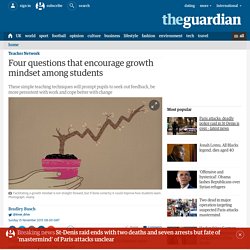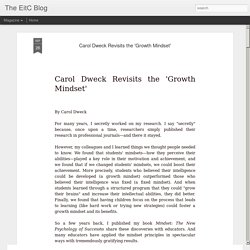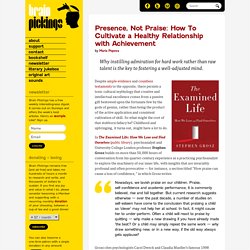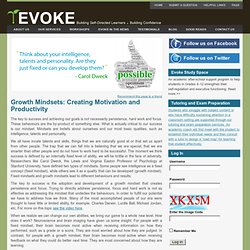

Beyond Working Hard: What Growth Mindset Teaches Us About Our Brains. A UPenn psychologist says 'grit' is key to success in life — here's how to become a grittier person. People love personality tests, and I’m no exception, so I was thrilled to find a copy of the “grit scale” in Angela Duckworth’s new book, “Grit.”

Your agreement or disagreement with 10 statements, including “I often set a goal but later choose to pursue a different one” and “I have overcome setbacks to conquer an important challenge,” produces a total grit score, which reveals how much passion and perseverance you typically display. (You can take a 12-item version of the scale here.) Your grit score is important because, according to Duckworth, a professor of psychology at the University of Pennsylvania, it strongly influences how far you’ll go in life. Four questions that encourage growth mindset among students.
Teachers have long battled with how to get their students to become more resilient and improve their mindset.

One popular theory, pioneered by Carol Dweck, professor of psychology at Stanford University, is the idea of growth mindset. EdintheClouds: Carol Dweck Revisits the 'Growth Mindset' By Carol Dweck For many years, I secretly worked on my research.

I say "secretly" because, once upon a time, researchers simply published their research in professional journals—and there it stayed. However, my colleagues and I learned things we thought people needed to know. The Risks of Rewards. ERIC Digest December 1994 ERIC Identifier: ED376990 By Alfie Kohn.

What Believing in the Possibilities Can Do For Learning and Teaching. Developing a Growth Mindset in Teachers and Staff. The New Psychology of Success (2000), Dweck developed a continuum upon which people can be placed, based upon their understandings about where ability comes from. For some people (at one end of said continuum), success (and failure) is based on innate ability (or the lack of it). Deck describes this as a fixed theory of intelligence, and argues that this gives rise to a ‘fixed mindset’. At the other end of the continuum are those people who believe success is based on a growth mindset.
These individuals argue that success is based on learning, persistence and hard work. According to Dweck: In a fixed mindset students believe their basic abilities, their intelligence, their talents, are just fixed traits. FAIL - First Attempts in Learning. A Life Lessons in Selling Pineapple! Brave Heads. 5 Tips for a Happy Life from Winnie the Pooh. “Did you ever stop to think, and forget to start again?”

“Well,” said Pooh, “what I like best — ” and then he had to stop and think. Because although eating honey was a very good thing to do, there was a moment just before you began to eat it which was better than when you were, but he didn’t know what it was called.” Winnie the Pooh is a kind bear. He cares greatly about his friends. And he has always seemed like a pretty happy bear to me. He’s also a favorite of mine so today I’d like to simply share 5 of my favorite happiness tips from that honey loving bear. 1. “You can’t help respecting anybody who can spell TUESDAY, even if he doesn’t spell it right; but spelling isn’t everything. Getting bogged down in details, focusing on the small problems can have advantages. Don’t make the classic mistakes of spending too much time nitpicking or making mountains out of molehills.
Coddled kids paying high price: expert. A generation of "snowplough" parents have pampered their children so much that they are driving a mental health epidemic among today's teenagers, a leading Australian child psychologist says.

Psychologist Michael Carr-Gregg. Picture: DAVE TEASE Dr Michael Carr-Gregg, a high-profile parenting expert who spoke to teachers and parents at The Illawarra Grammar School this week, said many Generation X parents had made their children's lives so easy that the kids were left with no way to handle problems or overcome obstacles on their own. "This generation of parents just push all the obstacles out of the way and try to make life as simple and as easy as possible for their kids," he said. "On the face of it, that's admirable because we all want the best for our kids, but it teaches them absolutely nothing about resilience and creates immense vulnerability when they leave home and go into the big wide world. " "The parents are time poor, they are guilty and they tend to indulge their kids too much. " The idea you can put a number against a child's ability is flawed and dangerous. For the past 14 years Alison Peacock has run an unconventional school.
Grades are not the focus; children aren’t told attainment levels and the information is only disclosed if parents ask. As head of the Wroxham school in Hertfordshire, Peacock is the perfect addition to a new commission set up by school reform minister, Nick Gibbs, to explore new ways for primary schools to monitor pupil progress after levels were scrapped. Angela Lee Duckworth: The key to success? Grit.
Carol Dweck: The power of believing that you can improve. Giving Good Praise to Girls: What Messages Stick. How to praise kids: It’s a hot topic for many parents and educators.

A lot of the conversation around it has stemmed from studies by Carol Dweck, professor of psychology at Stanford who has been researching this specific topic for many years. “My research shows that praise for intelligence or ability backfires,” said Dweck, who co-authored a seminal research paper on the effects of praise on motivation and performance. “What we’ve shown is that when you praise someone, say, ‘You’re smart at this,’ the next time they struggle, they think they’re not.
It’s really about praising the process they engage in, not how smart they are or how good they are at it, but taking on difficulty, trying many different strategies, sticking to it and achieving over time.” But what some might not know is that this paradox is strongest for girls. “Of all the subjects on earth, people think math is the most fixed,” Dweck said.
Fixed vs. Growth: The Two Basic Mindsets That Shape Our Lives. “If you imagine less, less will be what you undoubtedly deserve,” Debbie Millman counseled in one of the best commencement speeches ever given, urging: “Do what you love, and don’t stop until you get what you love. Work as hard as you can, imagine immensities…” Far from Pollyanna platitude, this advice actually reflects what modern psychology knows about how belief systems about our own abilities and potential fuel our behavior and predict our success. Much of that understanding stems from the work of Stanford psychologist Carol Dweck, synthesized in her remarkably insightful Mindset: The New Psychology of Success (public library) — an inquiry into the power of our beliefs, both conscious and unconscious, and how changing even the simplest of them can have profound impact on nearly every aspect of our lives.
One of the most basic beliefs we carry about ourselves, Dweck found in her research, has to do with how we view and inhabit what we consider to be our personality. The Trouble With Bright Girls. Five Reasons to Stop Saying "Good Job!" (**) - Alfie Kohn. September 2001 By Alfie Kohn NOTE: An abridged version of this article was published in Parents magazine in May 2000 with the title “Hooked on Praise.”

For a more detailed look at the issues discussed here — as well as a comprehensive list of citations to relevant research — please see the books Punished by Rewards and Unconditional Parenting. Para leer este artículo en Español, haga clic aquí. Hang out at a playground, visit a school, or show up at a child’s birthday party, and there’s one phrase you can count on hearing repeatedly: “Good job!”
Plenty of books and articles advise us against relying on punishment, from spanking to forcible isolation (“time out”). Lest there be any misunderstanding, the point here is not to call into question the importance of supporting and encouraging children, the need to love them and hug them and help them feel good about themselves. Presence, Not Praise: How To Cultivate a Healthy Relationship with Achievement.
By Maria Popova Why instilling admiration for hard work rather than raw talent is the key to fostering a well-adjusted mind.

Despite ample evidence and countless testaments to the opposite, there persists a toxic cultural mythology that creative and intellectual excellence comes from a passive gift bestowed upon the fortunate few by the gods of genius, rather than being the product of the active application and consistent cultivation of skill. So what might the root of that stubborn fallacy be? Childhood and upbringing, it turns out, might have a lot to do. Nowadays, we lavish praise on our children. Presence, Not Praise: How To Cultivate a Healthy Relationship with Achievement.
New Research: Students Benefit from Learning That Intelligence Is Not Fixed. Growth Mindset Video. Growth Mindsets: Creating Motivation and Productivity. The key to success and achieving our goals is not necessarily persistence, hard work and focus.

These behaviours are the by-product of something else. What is actually critical to our success is our mindset. Mindsets are beliefs about ourselves and our most basic qualities, such as intelligence, talents and personality. We all have innate talents and skills, things that we are naturally good at or that set us apart from other people. Carol Dweck: The Effect of Praise on Mindsets. Why the Growth Mindset is the Only Way to Learn. “You’re too old to learn a foreign language.” Top Ten Tips for developing a Growth Mindset in your Classroom. Be Critical. Developing a growth mindset in the classroom. There’s a free info graphic version of this article. To download it, click here.
Becoming a growth mindset school. The Learning Myth: Why I'll Never Tell My Son He's Smart. By: Salman Khan Join the #YouCanLearnAnything movement My 5-year-old son has just started reading. Growth Mindset Maths - Growth Mindset Maths. New Research: Students Benefit from Learning That Intelligence Is Not Fixed.